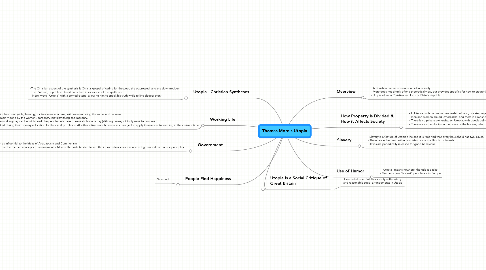Thomas More's Utopia
by Rochelle Shaw

1. Utopia - Christian Syntheses
1.1. -The Christian aspect of the synthesis is Christ's gospel of caring for the poor, the oppressed, and the downtrodden -The Platonic, Republican tradition is the Greek aspect of the syntheses - More wrote "Utopia" with a comedic tone, allowing him to speak his truth while telling deeper story
2. Working Life
2.1. - Agriculture is the most important job on the island. Every person is taught it and must live in the countryside, farming, for two years at a time, with women doing the same work as men - Parallel to this, every citizen must learn at least one of the other essential trades: weaving (mainly done by the women), carpentry, metalsmithing and masonry. - All able-bodied citizens must work; thus unemployment is eradicated, and the length of the working day can be minimised: the people only have to work six hours a day (although many willingly work for longer). - More does allow scholars in his society to become the ruling officials or priests, people picked during their primary education for their ability to learn. All other citizens are however encouraged to apply themselves to learning in their leisure time.
3. Government
3.1. - The politics of Utopia have been seen as influential to the ideas of Anabaptism and Communism - While utopian socialism was used to describe the first concepts of socialism later Marxist theorists tended to see the ideas as too simplistic and not grounded on realistic principles.
4. Utopia is a Social Critique of Great Britain
4.1. -Contrasts Great Britain's society with orderly and reasonable social arrangements in Utopia
5. People Find Happiness
5.1. New node
6. Overview
6.1. - A Christian humanist view of an ideal society - More does not simply offer a theoretical view, but provides specifics for how to create this world - Utopia offers a Christianized form of Plato's Republic
7. Use of Humor
7.1. - "Utopia" means nowhere: the title is a joke. - Mentions how "honest" people are in Europe.
8. How Property is Divided & How it Affects Society
8.1. - In Utopia, with communal ownership of land, private property does not exist - men and women are educated alike, and there is almost complete religious toleration. - There is no private ownership on Utopia, with goods being stored in warehouses and people requesting what they need. - There are also no locks on the doors of the houses, which are rotated between the citizens every ten years
9. Slavery
9.1. - Slavery is a feature of Utopian life and it is reported that every household has two slaves. - Slaves are either from other countries or are the Utopian criminals. -Slaves are periodically released for good behaviour.


